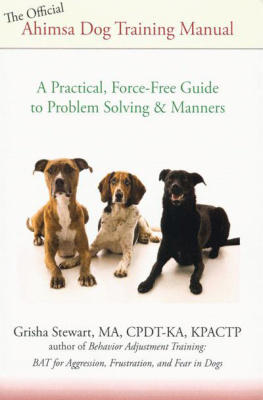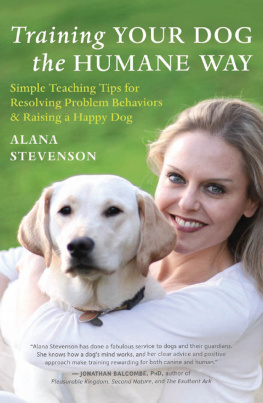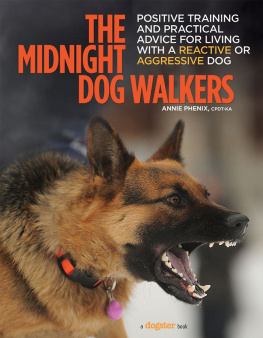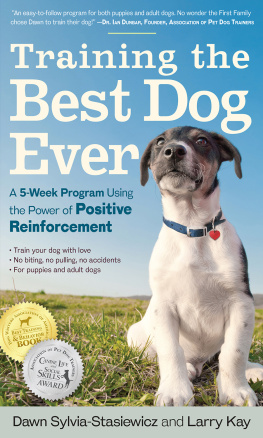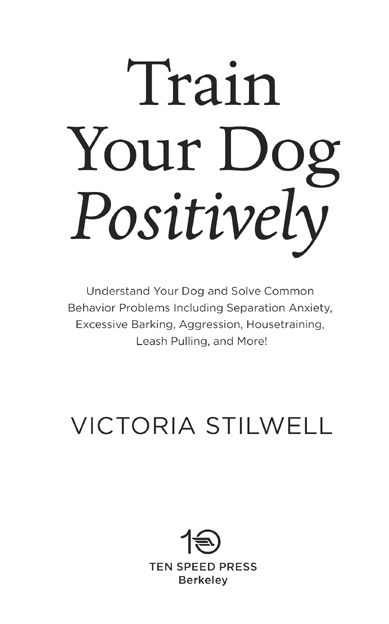Copyright 2013 by Victoria Stilwell, Inc.
Photographs copyright 2013 by Parker Smith
All rights reserved.
Published in the United States by Ten Speed Press, an imprint of the Crown Publishing Group, a division of Random House LLC, New York, a Penguin Random House Company.
www.crownpublishing.com
www.tenspeed.com
Ten Speed Press and the Ten Speed Press colophon are registered trademarks of Random House LLC.
Library of Congress Cataloging-in-Publication Data
Stilwell, Victoria.
Train your dog positively : understand your dog and solve common behavior problems including separation anxiety, excessive barking, aggression, house-training, leash pulling, and more! / Victoria Stilwell.
pages cm
Includes bibliographical references and index.
Summary: Victoria Stilwell, positive reinforcement dog trainer and star of the hit Animal Planet TV show, Its Me or the Dog, explains how to use her force-free, scientifically-backed training methods to solve common canine behavior problemsProvided by publisher.
1. DogsTraining. 2. DogsBehavior. I. Title.
SF431.S75 2013
636.70835dc23
2012045637
Trade Paperback ISBN: 978-1-60774-414-6
eBook ISBN: 978-1-60774-415-3
v3.1_r1
Contents
PART ONE
The Relationship: The Way Dogs Developed, How They Learn, and What We Need to Know to Understand Them
PART TWO
Behavioral Training Solutions
Acknowledgments
There are many people who have helped and inspired me to write this book. First among these is my husband, Van, who is such a remarkable man in every way: he has kept me sane through all the filming and traveling, and his editing has been instrumental in helping me to shape this book into what it is. He works tirelessly alongside me to spread the word about humane training and is dedicated to positively affecting the lives of dogs around the world. I also thank my beloved family on both sides of the pond for all their love and support, my dear friends who are always there for me, and my wonderful editor for this book, Lisa Westmoreland.
In my work as a dog trainer and author, I have been inspired by some of the greatest minds behind the science of modern dog training, including the incredible Dr. Patricia McConnell, Dr. Karen Pryor, Dr. Nicholas Dodman, Dr. Ian Dunbar, James OHeare, Jean Donaldson, Dr. Stanley Coren, Suzanne Clothier, Pat Miller, Nicole Wilde, and more. Thank you to all those who have helped forge a path forward against sometimes stiff headwinds on behalf of the movement toward positive training.
Thanks also to my tremendous team of Victoria Stilwell Positively Dog Training (VSPDT) trainers. I am very proud to be affiliated with each of you and continue to be amazed and inspired by your passion, dedication, and drive to ensure that everyone has access to people who truly understand dogs and work hard to combat the damage that has been done by punitive training methods. Our shared goal of making the world a better place for dogs and their people is within reach!
To my father, Malcolm Stilwell, thank you for working so hard to give me the best start in life, and to my grandmother, Estelle Hepworth, for fostering my love of dogs. To Garry Gross, my former dog training partner in Manhattan, I loved sharing the journey with you. I miss you all so much.
And finally, I thank my daughter, Alexandra, who makes me a better person every day. Her goodness, kindness, compassion, sense of justice, and love for life, people, and animals is a constant inspiration and a joy to behold. I have been blessed with many fantastic opportunities and achievements in my career, but the production I am most proud of and honored to consider a success comes from being a wife and motherraising a child who makes the world an infinitely better place. I am the proudest mother in the world, and I love you, Alex, with all my heart.
Introduction
Positive reinforcement works great on easy dogs, but its not really effective on severe aggression cases, is it?
As one of the worlds most vocal proponents of force-free dog training methods, I get asked this type of question frequently, usually by people who are pretty sure they already know the answer. Over the past several decades, science and history have taught us so much about how dogs think, feel, and learn, yet some dog trainers and owners still believe the only way to communicate effectively with a difficult dog is to teach it whos boss and force it into some mythical state called calm submission. The issues arising from this common and fundamental misunderstanding of our canine companions are what motivate me every day to continue my work as a dog behavior consultant and educator.
There are many different terms used to describe the type of teaching methods I use: positive reinforcement, reward-based, force-free, and more. Proponents of these interrelated philosophies have a shared belief that it is much safer, more effective, and humane to teach animals using this overarching concept: If you reward a behavior you like, it is more likely that that behavior will be repeated. Similarly, if you ignore or redirect a behavior you dont like, it is more likely that incidences of that behavior will decrease.
Thats a very simplistic synopsis of what reward-based training is and how it works, but that general concept lays the foundation for everything a dog owner needs to know to build a healthy relationship with any dog. Combine this concept with an awareness that dogs are not wolves trying to dominate us, so do not need to be controlled using dominance-based punishment techniques, and you have the recipe for what I call positive training throughout this book.
Unfortunately (but predictably), those who still promote punitive, outdated traditional training methods arent going quietly. There is a fierce debate raging in the dog training world between these two camps, and as a result, positive trainers regularly hear the same old tired arguments and accusations:
Theres more than one way to train a dog.
Reward-based training methods dont work on severe behavior problems such as aggression.
Dogs only respect leaders who assert their dominance.
Force-free trainers dont use discipline.
Training a dog with food is tantamount to bribery.
If you train a dog using food, he or she will respond only when youre holding treats.
Dogs that misbehave or show aggression are trying to be dominant.
Dogs are pack animals like wolves and are hell-bent on becoming the alpha or top dog over their owners.
Every one of these statements is almost completely backward, and Ill get to each one of them (and more) in detail in the course of this book. For now, I can say that there are many, many ways to effectively and humanely teach your dogprovided that you start from the basis of positive reinforcement principles rather than outdated and misguided theories of dog behavior.
There is a great deal of publicly available misinformation about how to build balanced relationships with our dogs based on submissioninformation that is purportedly the key to making our lives and relationships with our dogs better. If we could ask our dogs, I have no doubt they would let us know emphatically that such concepts as forced balance and supposedly contented submission are a pretty far cry from what theyre actually feeling most of the time.






